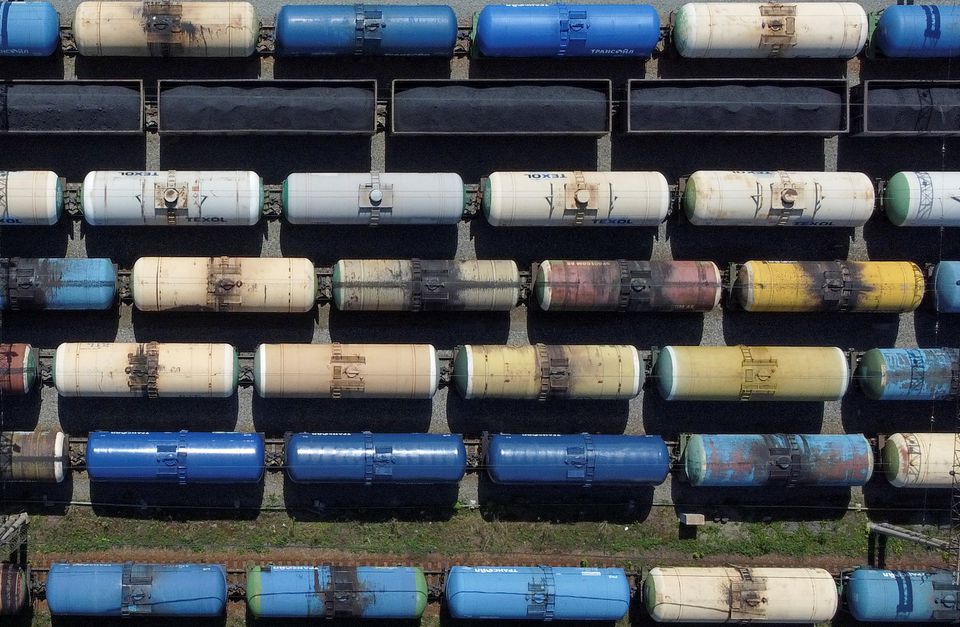Russia eased some of the restrictions on Sept. 25, saying it would allow the export of bunkering fuel for some vessels and diesel with high sulphur content.
But analysts say importers will still have to find alternative sellers until Russia can replenish its own stocks.

WHAT CAUSED THE PROBLEM?
Traders said the fuel market in Russia, one of the world's biggest oil producers, was hit by a combination of factors including maintenance at oil refineries, bottlenecks on railways and the weakness of the rouble, which incentivises fuel exports.
Russia tried to tackle the diesel and gasoline shortages in recent months but turned to export curbs to prevent a fuel crisis, which could be awkward for the Kremlin as a presidential election looms in March.
HOW BIG A PROBLEM IS THIS FOR WORLD FUEL MARKETS?
The diesel ban will have the biggest impact because Russia is the world's top seaborne exporter of the fuel, just ahead of the United States.
It shipped an average 1.07 million barrels per day (bpd) of diesel from the start of the year to Sept. 25, accounting for more than 13.1% of the total seaborne diesel trade, according to oil analytics firm Vortexa.
It is a much less significant gasoline exporter, shipping an average 110,000 bpd in the year to Sept. 25, Vortexa said.
HOW LONG WILL THE BAN LAST?
Russia said exports would resume once it had stabilised its domestic market, but did not give a precise timeline.
Analysts, such as consultancy FGE Energy, said the ban on diesel could last up to two weeks before Russia replenishes its stocks and resumes exports.
Expectations for the length of the gasoline ban vary. JP Morgan said it could last a couple of weeks until harvest season concludes in October, while FGE Energy said replenishing Russia's gasoline stocks could take up to two months.
WHO WILL BE MOST AFFECTED?
After the European Union banned Russian fuel imports over Moscow's invasion of Ukraine, Russia diverted Europe-bound exports of diesel and other fuels to Brazil, Turkey, several North and West African countries and Gulf states in the Middle East. Gulf states, which have their own major refineries, re-export the fuel. The Russian ban will change those flows again.Diesel supplies from Russian ports to Brazil reached about 4 million metric tons in the year to Sept. 25, compared with 74,000 tons in all of 2022, LSEG data showed. The Russian fuel replaced Brazil's imports of diesel from the United States.
A prolonged Russian ban on diesel exports could force Brazil to replace up to 400,000 tons of the fuel per month, market sources said.Turkey was the top destination for diesel supplies from Russian ports after the EU embargo, which totalled about 7 million tons since the start of this year, but it will still be able to buy Russian high-sulphur gasoil, traders added.
WHERE WILL ALTERNATIVE SUPPLIES COME FROM?
African states are expected to turn to supplies of gasoil and diesel shipped from the Middle East, India and Turkey, trading and shipping sources said.
At least 132,000 tons of September-loading diesel will be heading to Africa from Oman's new Duqm refinery, shiptracking data from Kpler and two shipbroking firms showed.
Latin American importers are likely to turn to the U.S. Gulf Coast and the Middle East, traders said.
Diesel exports from the Middle East to Latin America were at an eight-month high of 315,000 tons, shiptracking data from Kpler and a shipbroking source showed.
Europe could also fill some of the gap left by the Russia gasoline ban. Northwest European suppliers, which lost market share in West Africa to Russian supplies this year, could step in, FGE said.
WHAT WILL THE CHANGE IN FUEL TRADE FLOWS MEAN FOR EUROPE?
Since banning Russian fuel imports, Europe has been seeking suppliers elsewhere, including from the Middle East. Competition for those supplies will now increase because of Russia's ban, which will have a knock-on impact on Europe.
As a result, traders said they expected Northeast Asian refiners in China and South Korea to boost diesel exports to Europe.
China exported about 190,000 tons of diesel to Europe in September, with 45,000 tons scheduled to load in October also bound for Western countries, Kpler shiptracking data and data from one shipbroking source showed. (Reuters)